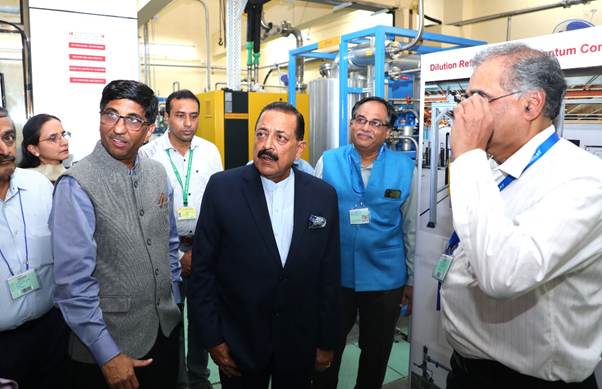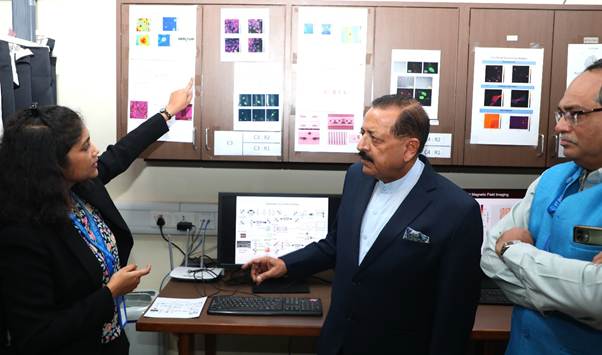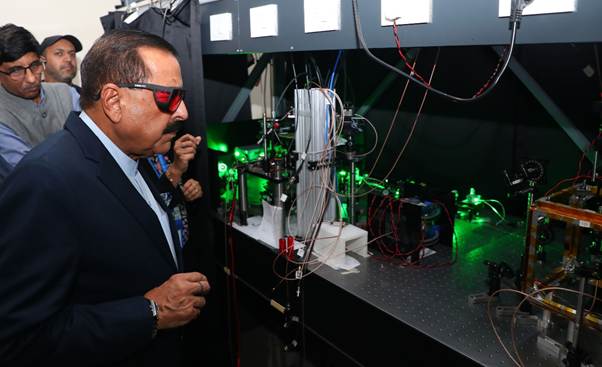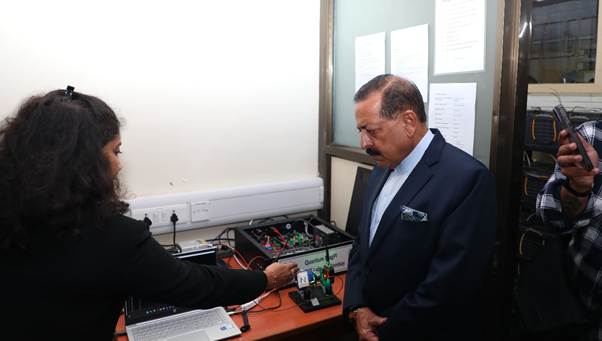Ministry of Science & Technology
Dr Jitendra Singh lauds Quantum sensing breakthroughs by IIT Bombay, inaugurates India's first Liquid Helium Cryogenic facility
India Showcases First Indigenous Quantum Magnetometer, Diamond Microscope During Minister’s IIT Bombay Visit
Minister Inaugurates New Liquid Helium Facility at IIT Bombay, Boosting India’s Cryogenic & Quantum Research Capacity
Quantum Diagnostics, Advanced Imaging and AI-Integrated Sensors Mark India’s Rising Deep-Tech Strength: Dr. Jitendra Singh
India Boosts Quantum & Cryogenic Capabilities as Dr. Jitendra Singh Launches Low-Cost, High-Efficiency Liquid Helium Facility
Quantum Microscope Developed at IIT Bombay Marks Major Step Toward Early Cancer Diagnosis and Advanced Biomedical Innovation
Minister Reaffirms India’s Commitment to Frontier Technologies as IIT Bombay Unveils Key Quantum and Cryogenic Infrastructure
Posted On:
24 NOV 2025 7:46PM by PIB Delhi
Union Minister of State for Science & Technology; Minister of State (Independent Charge) for Earth Sciences; MoS PMO, Personnel, Public Grievances, Pensions, Atomic Energy and Space, Dr. Jitendra Singh today reaffirmed the Government of India’s commitment to advancing frontier technologies by visiting the Quantum Research Laboratories at IIT Bombay and inaugurating the Institute’s new Liquid Helium Facility, an important milestone in India’s growing ecosystem of quantum science, cryogenics, advanced materials, and next-generation computing.
During his visit to the Quantum Lab, the Minister reviewed India’s first series of indigenous quantum sensing and imaging platforms that signal a major leap in the nation’s R&D capabilities. He was briefed on QMagPI, the country’s first portable magnetometer capable of detecting ultra-low magnetic fields at the nanotesla (nT) scale. Developed using nitrogen vacancy (NV) centers-atomic-scale defects in diamond, the device enables high-precision magnetic sensing for strategic sectors, defense applications, mineral exploration, and scientific instrumentation. The Minister appreciated the team’s achievement in creating a compact, scalable system that places India among a select group of nations with such capabilities. He noted that the Department of Science & Technology (DST) has supported this advancement, enabling translation of deep science into real-world applications.
The Minister also witnessed India’s first indigenous Quantum Diamond Microscope (QDM), built by IIT Bombay’s PQuest Group. Powered by NV centers in diamond, the QDM allows nanoscale, three-dimensional magnetic field imaging and is poised to revolutionize widefield mapping in neuroscience, materials research, and semiconductor diagnostics. Integrated with AI/ML systems, the technology promises new breakthroughs in electronics, biology, geology, and next-generation chip testing, key pillars for India’s future technological leadership.
Highlighting the growing role of quantum technologies in healthcare, the Minister examined the Q-Confocal system, a homegrown confocal microscope engineered to exploit quantum properties of NV centers in nanodiamonds. Using T₁ relaxometry, this system enables sensitive detection of intracellular changes, particularly Reactive Oxygen Species (ROS) levels, which are critical for early-stage cancer diagnostics. Successful experiments on U87-MG glioblastoma and keratinocyte cells demonstrate the ability of the platform to measure disease-related changes at the nanoscale. Dr. Singh commended the innovation team and underlined that such quantum-enabled biomedical tools represent India’s increasing convergence of health sciences and high technology.
Following the lab visit, Dr. Jitendra Singh inaugurated the Liquid Helium Facility, describing it as a foundational national research asset that will significantly boost India’s capabilities in cryogenic engineering, superconductivity, quantum computing, quantum sensing, photonics, healthcare technologies, and green energy devices. Highlighting that liquid helium is indispensable for MRI systems, advanced materials characterization, and cryogenic electron microscopy (cryo-EM), he noted that the new facility, now dedicated to the nation and open for use by industries, universities, and research institutes- is equipped with an efficient helium recovery system that is expected to reduce the cost of cryogenic experiments to nearly one-tenth of current expenses while conserving one of the world’s rarest resources.
The Minister said that as global demand for quantum computers rises, India must simultaneously strengthen its cryogenics infrastructure. He noted that quantum computing depends critically on dilution refrigerators, which operate at ultra-low temperatures of around 10 millikelvin (below –272°C). Since these systems rely on advanced cryogenic support, the inauguration of the Liquid Helium Facility lays the foundation for future indigenous development of dilution refrigeration units, a strategic requirement for India’s long-term technological self-reliance. He acknowledged that unlike the quantum technologies reviewed earlier, the Liquid Helium Facility has not yet received DST support, pointing to the need for greater national collaboration to scale indigenous cryogenic capabilities.
Dr. Singh stated that both the Quantum Lab advancements and the new cryogenics facility reflect India’s fast-expanding leadership in next-generation science and technology. He said these achievements align with Prime Minister Narendra Modi’s vision of a Viksit Bharat, where deep-tech research, strategic innovation, and indigenous development drive India’s global competitiveness. He added that IIT Bombay’s work demonstrates how academia, government, and industry can jointly build a world-class scientific ecosystem capable of shaping the technologies of the future.
The Minister congratulated the researchers, faculty, and students of IIT Bombay for their pioneering contributions and assured continued government encouragement for breakthroughs in quantum science, cryogenics, healthcare innovation, and national technology missions.




*****
NKR/AK
(Release ID: 2193757)
Visitor Counter : 3394